#Li Qingzhao
Text

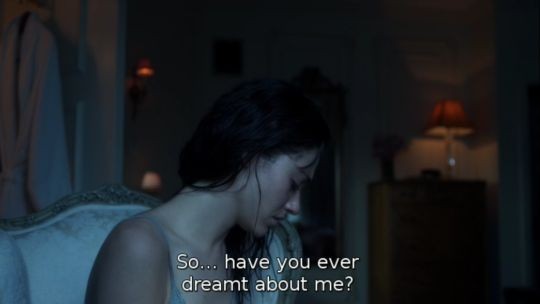





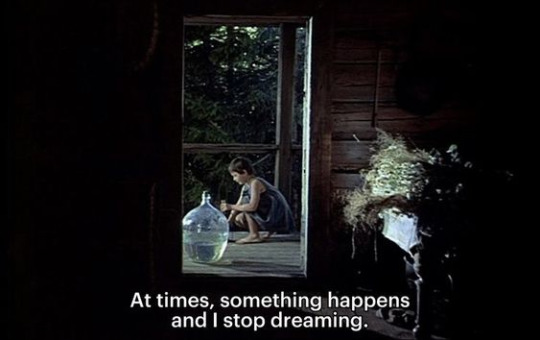
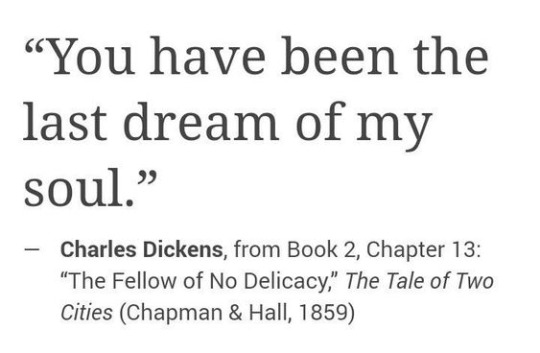


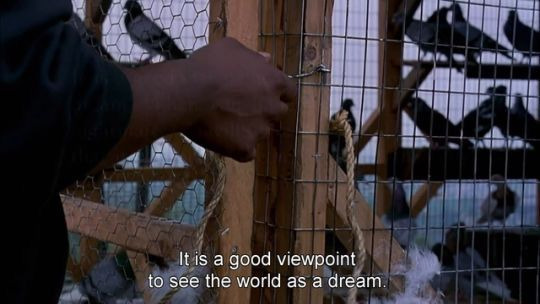
ON DREAMS
Clarice Lispector / pinterest / Augusto Cury / Li Qingzhao (tr. Jiaosheng Wang) Tune: The Pertridge Sky; Complete Poems / unknown / Blade Runner 2049 (2017) dir. Denis Villeneuve / Victor Hugo from a letter to Adèle Foucher written March 1822 / unknown / Charles Dickens The Fellow of No Delicacy; The Tale of Two Cities / Anaïs Nin The Diary of Anaïs Nin / Sappho XII / Ghost Dog: The Way of the Samurai dir. Jim Jarmusch
#it's like impossible to reverse image search movies forgive me#on dreams#on dreaming#web weave#web weaving#poetry parallels#poetry compilation#clarice lispector#augusto cury#li qingzhao#jiaosheng wang#the pertridge sky#blade runner#denis villeneuve#victor hugo#adele foucher#charles dickens#the tale of two cities#anais nin#sappho#on love#on loneliness#oh falling in love#on heartbreak#on emotion#poetry#spilled poetry#spilled thoughts#spilled ink#poem
537 notes
·
View notes
Text
Happy Gushiwensday Shabbes! We have another Li Qingzhao for you tonight, to the tune of "Dream Song."
I'll always remember the water pavilion at sunset.
Hah--I say that--I was so drunk
I didn't remember my own address.
But I remember I was done with the whole evening.
Told you to get in and turn the boat around.
You--you--accidentally drove it into a bunch of lotuses.
We were fighting to get free,
fighting the oars and cursing the boat,
and up from the shallows--startled by the noise--
came a whole flock of waterbirds.
"Notes" and original text under the cut!
如梦令·常记溪亭日暮
常记溪亭日暮,沉醉不知归路。兴尽晚回舟,误入藕花深处。争渡,争渡,惊起一滩鸥鹭。
This time I don't actually have any notes, I just have a boring literal translation that I've prepared so you can see what's there in service of tone and what's from the actual text. You see, the (machine translation of) Baike's modern translation contains: "The sun was already setting, and I was lost in the beautiful scenery, forgetting my way home." I just thought it was so funny as a contrast to how I interpreted the poem that I had to go all the way to 11. So here's my literal.
I'll always remember the water pavilion at sunset.
I was drunk
and didn't know the way home.
I'd lost interest in the evening
and turned the boat around,
and accidentally went into the middle of all the lotus flowers.
We struggled to row;
we struggled to row;
and startled into the air, from the shallows,
several waterbirds.
28 notes
·
View notes
Text
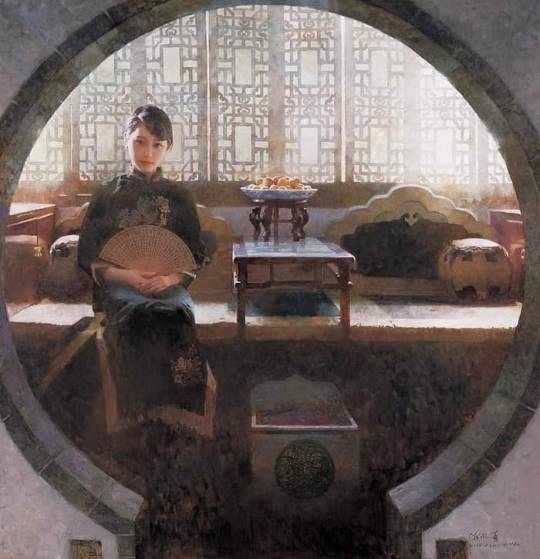
武陵春 / 宋代 李清照 Li Qingzhao, Song dynasty
風住塵香花已盡,日晚倦梳頭。物是人非事事休,欲語淚先流。
聞說雙溪春尚好,也擬泛輕舟。只恐雙溪舴艋舟,載不動、許多愁。
About this poetry (First of 2 paragraphs), She wrote it about Flowers has fallen on everywhere and the dust also filled with its flavor. and her husband had died, Everything were changed so she tired of combing her hair, then tears fall before talking in usual. (The last 2 paragraphs), She only fear the boat It could not carry her huge sadness on that river. In short, she had bear all the bitter feelings for alone with homeless that sad mind in the war at that time.
此詞描述她的晚年避難於金華期間,當時在紹興四年(西元1134)金與偽齊合兵南犯以後。那時,他的丈夫已病故,家藏的金石文物也散失殆盡,作者她孑然一身,流離失所在漫天烽火中飄泊,歷盡世路崎嶇和人生坎坷,因而詞情極為悲苦。上片就是訴說著眼前景物之不堪,心情之淒苦。下片藉以江水上的小船更深一層的表達,恐是無法承載她那沉重的悲愁。
▪︎ 李清照,(1084-1155)宋代,濟南(今屬山東)人。中國歷史上最著名的女詞人。自號易安居士。同是宋代的理學家朱熹(朱子)曾說:「本朝婦人能文者,惟魏夫人及李易安(李清照)二人而已。」幼有才藻,她工詩能文,詩尤為宋代大家,十八歲適金石家趙明誠,夫婦感情甚篤。宋室南渡之前,李清照生活美滿,前期作品熱情活潑,明快天真,多寫少女生活的無憂無慮,以及婚後的離別相思,充分表現女性閨閣的感情。南渡後其夫病故,她顛沛流離於江浙皖贛一帶,在孤寂中度過晚年。後期詞融入家國之恨與哀其身世又晚景淒涼之感,風格頓變。暮年飄零後,感情基調轉為凄愴沉鬱,如《聲聲慢》「尋尋覓覓,冷冷清清,凄凄慘慘戚戚」。她兼擅令慢,每能創意出奇,以經過提煉的口語表達其獨特真切的感受,形成辛棄疾所稱道的“易安體”。據《宋史·藝文志》中說,李清照有《易安居士文集》七卷、《易安詞》八卷,但已經遺失。現有《漱玉詞》輯本,現存約五十首左右。
🎨 oil painting by Chen Yanning 陳衍寧 (Chinese b. 1945)
19 notes
·
View notes
Text
to the tune "Like a Dream" - Li Qingzhao
who could forget this sunset from the pavilion by the water--!
however, drunk, I don't know my way home.
mood gone, my late-returning boat
stranded in a sea of lotus --
struggling
to get through --
startled up all the birds on the bank.
--
如梦令·常记溪亭日暮
李清照
常记溪亭日暮,沉醉不知归路。
兴尽晚回舟,误入���花深处。
争渡,争渡,惊起一滩鸥鹭。
this poem is so brief and deceptively simple -- I really struggled to do it justice.
10 notes
·
View notes
Photo
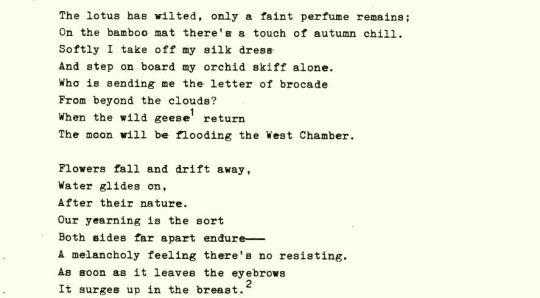

Sorrow of Separation, The Complete Ci-poems of Li Qingzhao: A New English Translation by Jiaosheng Wang
#sorrow of separation#li qingzhao#poetry#poem#translated literature#the complete Ci-poems of Li Qingzhao#classic literature#literature#quotes
240 notes
·
View notes
Text
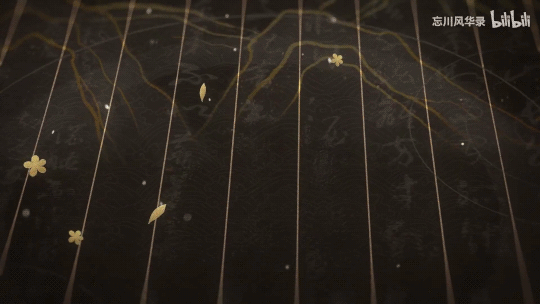

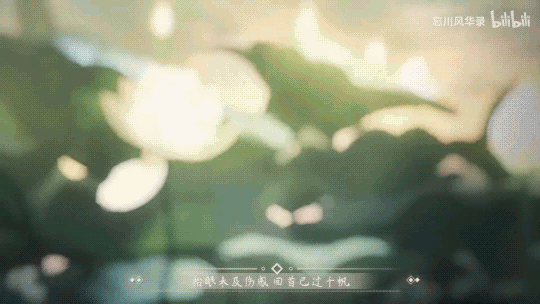
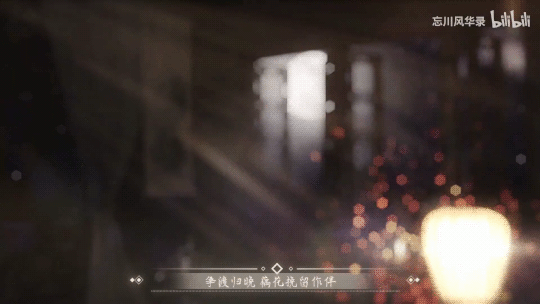
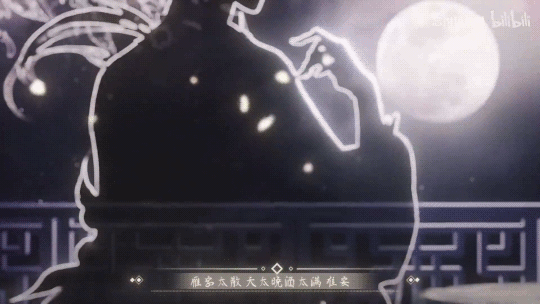

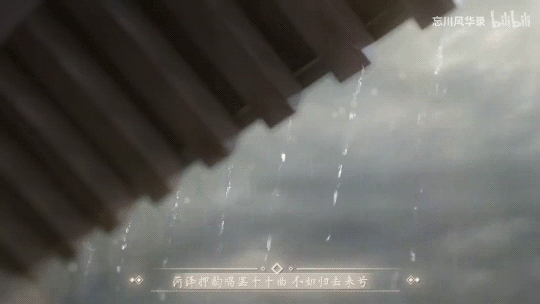

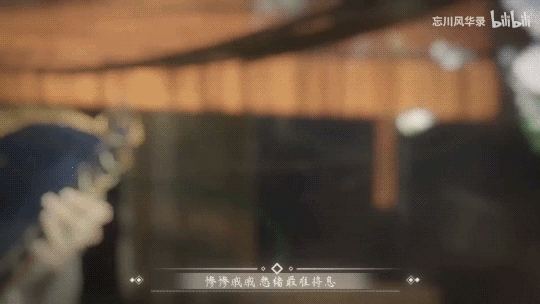

❝The flute is too slow, the wind too cold, the moon too dim... It's hard to feel at ease.❞
⛆
易安难安 / 【忘川风华录】
Wangchuan gifset — 6/?
#忘川风华录#Wang chuan feng hua lu#wcfhl#vocaloid#chinese vocaloid#chinese music#gufeng#gifset#gifs#moving gifs#gufeng music#synth v#synthesizer v#chiyu#chi yu#易安难安#yi an nan an#chiyu synthv#li qingzhao
3 notes
·
View notes
Text
"I search for you in my dreams."
-Li Qingzhao, from Complete Poems
#quotes#li qingzhao#dream#dream of you#in my dreams#literature#poetry#love quotes#love quote#beautiful quote#book quotes#dark academia quotes#literature quotes#love poetry#poetic#poets#poets on tumblr#poems#short poem#lit#books and literature#english literature#classic literature#words#excerpts
16 notes
·
View notes
Text
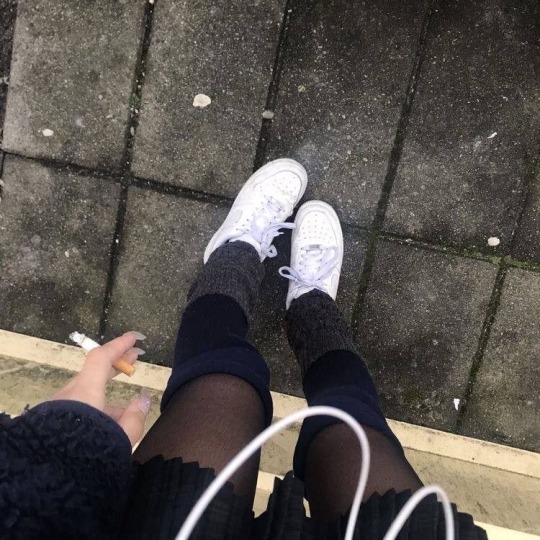

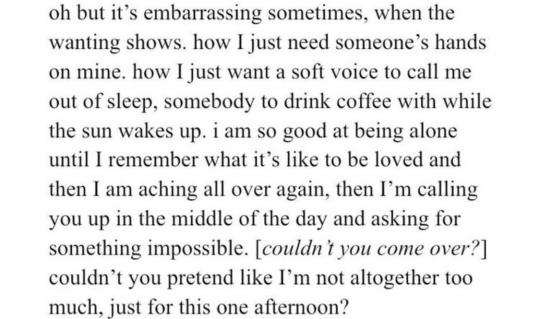
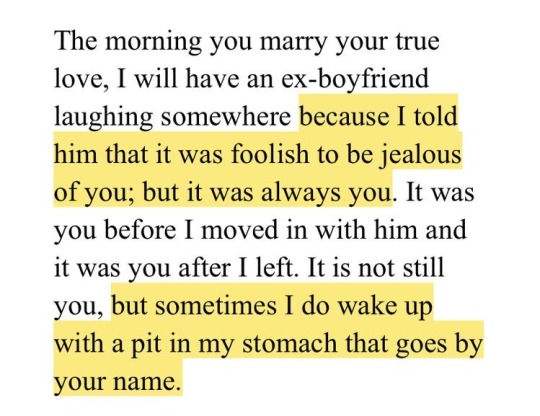

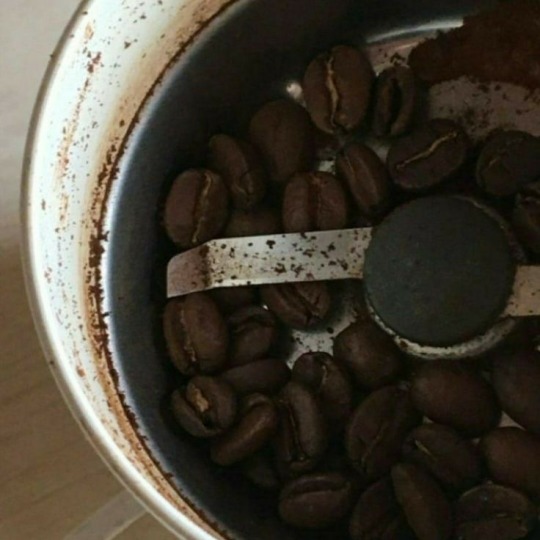
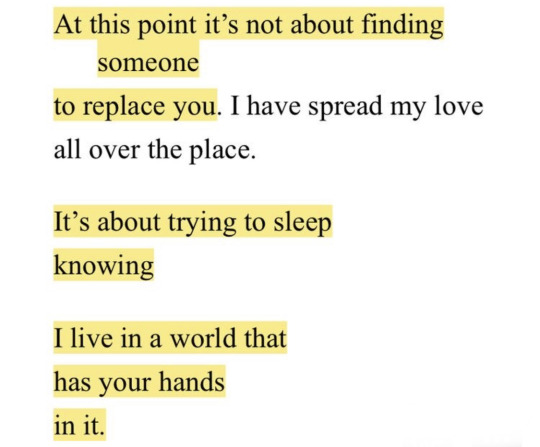

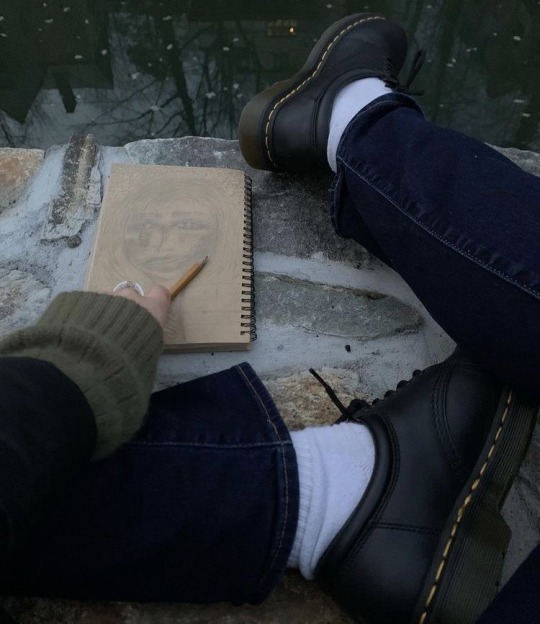

"I search for you in my dreams."
-Li Qingzhao
#Li Qingzhao#quotes#dark academia#literature#dark acadamia aesthetic#light academia#coffee#autumn#fall#books#aesthetic#a e s t h e t i c#chaotic academia aesthetic#rain#chaotic academia#romanticizing life#sad quotes#deadpoetsociety#book aesthetic#book quotes#brown aesthetic#dreams#longing#love#unrequited love#book excerpt#romantic academia#dark aesthetic#dead poets society
98 notes
·
View notes
Text
"I search for you in my dreams."
Li Qingzhao
#li qingzhao#my love#literature#poetry#poem#poems and quotes#spilled thoughts#quotes#words#lit#love quotes#chinese literature
10 notes
·
View notes
Text
The Wild Swans
Li Qingzhao
translated from the French of Judith Gautier by James Whitall
Before daybreak the breezes whisper
through the trellis at my window;
they interrupt and carry off my dream,
and he of whom I dreamed
vanishes from me.
I climb upstairs
to look from the topmost window,
but with whom? . . .
I remember how I used to stir the fire
with my hairpin of jade
as I am doing now . . .
but the brasier holds nothing but ashes.
I turn to look at the mountain;
there is a thick mist,
a dismal rain,
and I gaze down at the wind-dappled river,
the river that flows past me forever
without bearing away my sorrow.
I have kept the rain of my tears
on the crape of my tunic;
with a gesture I fling these bitter drops
to the wild swans on the river,
that they may be my messengers.
#the wild swans#li qingzhao#poems#poem#writing#literature#poem post#poetry#french#translated#daybreak#dream#dreamed#dreams#window#mountain#mist#rain#tears
10 notes
·
View notes
Text
Li Qingzhao, "Dian jiang chun: Applying lip rouge", translated by Karen An-Hwei Lee.
"Sequestered in the women's chamber, I sense
a thousand strands of sorrow
sewn into an inch of my spirit.
To adore spring is to see spring leave
as light rain impels the flight of petals.
Restless, I lean over the balustrade,
the end of my intricate skein of desire.
Where is the one I love?
Only the skies touch dry perfumed grasses,
cutting off the path of his return."
15 notes
·
View notes
Text
一剪梅·红藕香残玉簟秋 - plum blossom cutting · red lotuses linger in remnants of fragrance
by 李清照 (Li Qingzhao, 1084 -1155)
红藕香残玉簟秋
hóngǒu xiāng cán yù diàn qiū
Red lotuses linger in remnants of fragrance; on bamboo mats, jade-like, there is a touch of Autumn.
轻解罗裳 独上兰舟
qīng jiě luōshang dú shàng lánzhōu
Slightly parting the light silk skirt, alone, she boards the magnolia-wood boat.
云中谁寄锦书来
yún zhōng shéi jì jǐnshū lái
From within the clouds, whose letter for home approaches?
雁字回时 月满西楼
yàn zì huí shí yuè mǎn xī lóu
When geese return in their word formation, the moon fills the west storeyed pavilion.
花自飘零水自流
huā zì piāolíng shuǐ zìliú
Alone, flowers fall. Alone, water flows on.
一种相思 两处闲愁
yī zhǒng xiāngsī liǎng chù xián chóu
A particular yearning in two places, twice the idle sorrow.
此情无计可消除
cǐ qíng wú jì kě xiāochú
This feeling which no scheme can dispel,
才下眉头 却上心头
cái xià méitóu què shàng xīntóu
was just shed from the brow, yet rises in the heart.
…………………………………………………………………………….
NOTES
F O R M A T
So this is another Song Lyric. But it is a song lyric in more ways than one.
《一剪梅·红藕香残玉簟秋》 is a 宋词 (sòng cí) or Song Dynasty lyric by the poet Li Qingzhao. The 词 lyric was a form that came after 诗 poetry. Unlike 诗 though, they are not just poems, but also literally lyrics. Each work has an accompanying melody.
To write a 词 piece, poets must use various poetic meters from fixed pattern forms, using fixed-rhythm, fixed-tone, and line-lengths that may vary based on an original melody also known as tune pattern 词牌 (cípái). The resulting lyrics are sung using that melody. Unfortunately, all of the melodies for these lyrics have been lost to time, though there have been attempts to reconstruct them in more modern times.
The title can usually be read as 《tune pattern title · first line of lyric》 and are often translated as: To the tune of <tune pattern/cipai title>, <first line of lyric>. I didn’t do that here to keep my title short xD
B A C K G R O U N D
Or my best guess at it anyway!
In the second year after Li Qingzhao's marriage to Zhao Mingcheng, due to ~political struggles~ between factions from the new court and the previous one, her father Li Gefei was dismissed from office and could only return to his place of origin with his family. Li Qingzhao as his daughter, was also implicated in this as a child of someone in the Yuanyou faction. It was decreed that children of criminal officials of the Yuanyou faction were not allowed to live in the capital, so she had no choice but to separate from her husband and return to her hometown alone to join her parents. This supposedly happened in the Summer of the year 1103, which was a year after their marriage.
As far as I know, this was the only time early on in their marriage that they were separated. So there’s a good chance this work was a result of that period in her life.
P O E M
红藕香残玉簟秋
red lotus / fragrance / remnants // jade / bamboo mat / Autumn
红藕 is an alternate name for the red lotus. A search on gushiju.net, with the field narrowed on Song Dynasty yields 27 poems with the word 藕 in their titles, and at least 15 in which the title is referring to a lotus flower of some sort. 香 can sometimes be used to allude to a flower, but I am leaning towards this one being about the lotus’ fragrance. And then, it is still difficult to see 残 and not think damaged and hence, incomplete. In this case, I suppose it would mean remnants. The remnants of the lotus’ lingering fragrance.
So, the speaker is near a water body. Somewhere where there is enough water and enough lotuses that their lingering fragrance can be smelled. Wikipedia tells me that lotus plants are adapted to grow in the flood plains of slow-moving rivers and delta areas, while Baidu informs me that they live where waters are calm and still, and where there is shallow waters, especially lakes, marshes and ponds. Let’s see where this poem takes us!
Two notes on the lotus:
The flowers of lotus plants bloom in the Summer and in the Autumn, they either bud or, having reached the end of their flowering season, fall.
I had to google 红藕 the way that I did, because the word 藕 refers to the root of the lotus, which we like very much to eat. It was instantly recognizable as the other half of 莲藕, meaning lotus root. When chopped and cooked in soup, it oxidizes and turns a pale brownish pink colour.
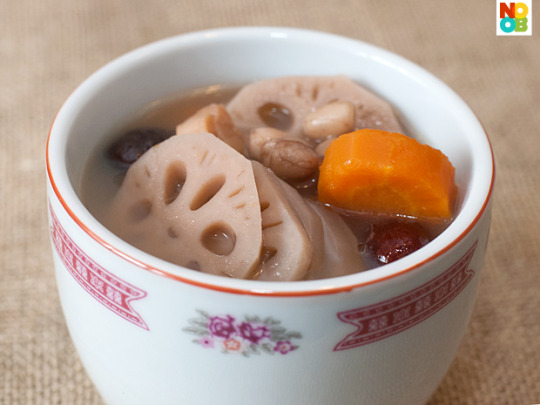
(Source)
While thinking about this, I got curious about how a full lotus plant looks like, and went to google for a picture. This was my first time seeing the full lotus plant, even in illustration. Should really have expected this, but somehow the position of the ‘root’ still surprised me.
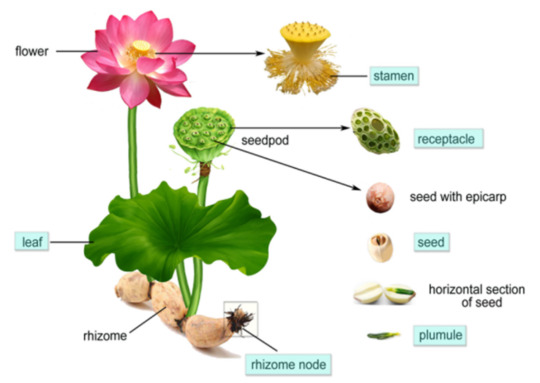
(Source)
A 簟 (diàn) is a mat of woven bamboo usually used for lying on or sitting. It has a cooling effect in the Summer, sort of like the waterbeds of today.
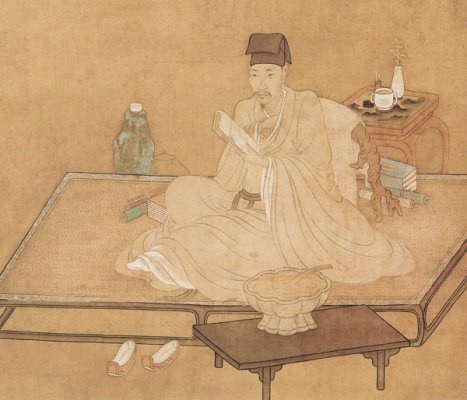
(Source)
The usage of 玉 in 玉簟, is a simile comparing the bamboo mat to jade. This is a way of describing the surface of the bamboo mat, that it has that same lustor and beauty, and that it is very cool to the touch, the way that jade (specifically jadeite as opposed to nephrite) is even at room temperature. Building on that, 秋 feels like an adjective. And yet, 秋 is Autumn. What is going on?
This is a depiction of a scene as felt through the senses. How do we know that there are lotuses wilting? Through the lingering notes of their fragrance. How do we know the season? Through the jade-like chill of the lustrous bamboo mat beneath us and the fading of the lotus’ fragrance. Autumn is here.
轻 / 解 / 罗裳 // 独 / 上 / 兰舟
gently / undoing / silk upper robe // alone / boarded / magnolia-wood boat.
The 解 usage here I thought was 解衣 at first - to take off an article of clothing (which, just FYI dates back to 《战国策》 Annals of the Warring States, edited and compiled by Liu Xiang of the Han Dynasty). And so the line was translated as: gently doffing silk summer robes.
But stealing a bit of time during team building at work (on stone ‘homework’ benches too!) to stare at this poem in my notebook, it suddenly didn’t make sense again… Although Autumn’s chill also explains why it's time to take off summer clothes, especially if you’re getting on a boat since its always colder and windier where there is water, there is quite a bit of an awkward time gap between changing out your summer clothes and getting on a boat!
This was when I concluded that it was TIME TO MOVE ON and look at this entire part of the poem as a whole.
A particular weave of silk fabric, 罗 (luō) is lightweight and very suitable for summer clothes. Here’s an example of a fancier type of it.

Meanwhile, the 裳 (read: shang) is the equivalent of a skirt. Like what the lady is wearing in the photo below.
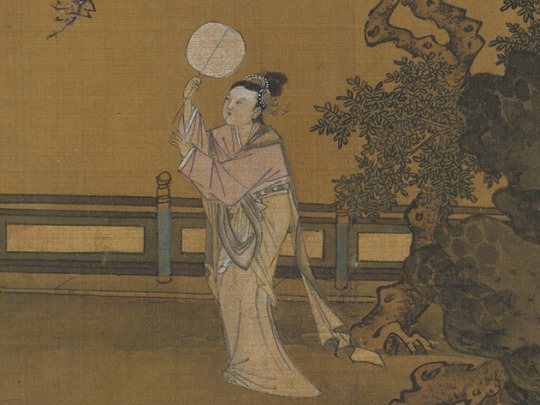
(Source)
兰舟 is actually just a fancier way to say ‘boat’. BUT it can apparently also mean bed, I didn’t manage to find any examples in my quick skim of gushiju, but a lot of dictionaries do say this, so I suspect it may just be rarely used. Its one of the many reasons I’ve been chewing at this line for a while.
The first 兰舟 was a boat made with wood from the magnolia tree by the famous architect, carpenter and engineer Lu Ban of the Zhou dynasty, according to a story in the lower volume of 《述异记》, which was a compilation of supernatural stories from the Northern and Southern Dynasties by Zu Chongzhi. By the way, he had A LOT of hobbies (whoa! see the ss below). This probably makes it the dated version of an urban legend? Anyway.

I do prefer to think the intended meaning was boat, not bed - just taking a moment here to be amused at the pronunciations of 船 (chuán) boat and 床 (chuáng) bed being so close in mandarin xD - because of the previous imagery from the association of lotuses with water bodies and vibe of the scene. The idea or image of 兰舟 in my mind is one that calls up feelings of being adrift and alone. A small little leaf of a boat on a vast lake. ‘Boarding alone’ reinforces that lonely image but also adds a hint of wanting to be on their own. After all, they chose to come here (wherever ‘here’ is).
So then, with the decision that the second half of the sentence will be some variation of ‘boarding the magnolia-wood boat alone’, there were two options for the action with the clothing or skirt in the first part of that sentence.
Deftly remove the light summer silks
Lightly part the silk skirts
Actually, upon first reading the line without pleco or googling, the image in option 1 automatically came up in my mind. But then it came to a screeching halt when she boarded the boat! Knowing that the chill of Autumn is upon us, surely it wouldn’t make sense to be wearing only lightly woven silk clothing and then be disrobing at this time? It makes even less sense to be wearing something light on top of more weather appropriate ones and then taking it off later. And there could be an unspoken step in between 轻解罗裳 and 独上兰舟 of putting on clothes. But that’s just hmmm… unnecessarily complicated.
But 解 doesn’t always mean remove completely. You could just be in the middle of untying a knot partially undoing something or perhaps, by extension, ‘partially disrobing’ via lifting up your skirt. Option 2 was adopted for finally being a mental image I can fully support.
And so, amidst the lingering fragrance of fallen lotus flowers, in the Autumn chill, someone gently parts her fine silk skirts and boards a boat alone.
The next two lines are where you have to activate all your vibe receptors.
云中 / 谁 / 寄 / 锦书 / 来
within clouds / who / sends / letter for home / coming here
雁 / 字 / 回 / 时 // 月 / 满 / 西 / 楼
geese / word / return / time // moon / fills / west / building
(I’m doing these together because they are closely related)
If we follow the narration in this poem, everything after 独上兰舟 is happening in the boat. The speaker is looking up into the sky, where they may be seeing the wild geese setting off on their annual migration. As it is Autumn, this is the right season for birds to be setting off on their long haul flights. Supporting this is the next line which starts with ‘when the geese return in their word formations’ referring to the V (in English) or 人 (in Chinese) shape they tend to fall into when flying as a flock.
Note the word ‘when’ (i.e. x happens 时). This is an imagined situation.

(Source)
Something I found out because I wondered why how birds could be flying when the moon is supposed to be out and vaguely to the West: Geese also continue their migratory flights at night to avoid predation and, to save energy, not be flying when there is turbulence in the air which occurs during the day where there are more thermals.
The 锦书, literally brocade letter, is a word derived from the story of the poet Su Hui, a poet of the Middle Sixteen Kingdoms period (304 to 439) during the Six Dynasties period. After a particularly fierce quarrel with the concubine her husband had brought back from his desert exile, she refused to leave with him to his new post in Xiangyang. Hence, when he finally went, he brought only his concubine along with him, leaving her behind as she had wanted. Soon after, she regretted the decision and embroidered a palindrome poem on silk brocade and sent it to him. This work consisted of over 840 words and could be read in many different ways and directions.
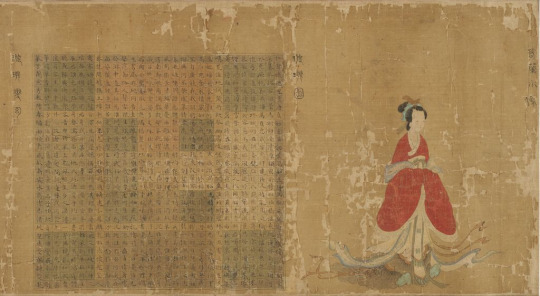
(Source)
The piece impressed and touched him so much that he returned to fetch her with gifts. The term 锦书 has since been used to refer to beautiful letters, usually from wife to husband but sometimes the other way round as well, when they are apart.
The sight of geese in the sky would evoke thoughts of letters from someone far from home. Originating from the story of a loyal diplomat of Han who had been sent as an ambassador to the Xiongnu, and suffered much hardship for it. When it was time for him to return, the Chanyu (Leader of the Xiongnu) pretended he was already dead and refused. Years later, another envoy discovered that he and his men were still alive. To force the Chanyu to release them, someone made up a story that the Emperor of Han had killed a migratory goose while hunting, and that a letter from Su Wu seeking help was found on the bird's foot, whereupon they all got to return home. The association of swan-geese with letters, wandering, longing and hope has only gotten deeper since, and its imagery is used often in literature.
We even have a chengyu for it! 鸿雁传书 / roughly: the swan-goose delivers a letter.
A little note on architecture. Courtyard houses, also known as siheyuan were the traditional type of houses built with a specific layout. The rooms on the West were reserved for the ladies in a family, the East were for the sons and their wives. For a more detailed introduction, do check out this video! The relevant portion starts at about the three minute mark.
Just purely from the position, rooms and buildings in the West side of the house have a good view for sunset and the moon as well. A friend pointed this out, and I was like O.O oh yeah! So it does! Perfect place for ~romance~ and staring longingly out into the distance.
After boarding the boat, she looks up at the sky where there are geese setting off Southwards on their annual Autumn-Winter migration, wondering if she will receive a letter from her husband. She pictures it clearly in her mind’s eye, when they return after Winter, there will be a full moon shining down, and her world will be bright and it will be a time of reunion.
No vibes now. These are all feelings from here on xD
花 / 自 / 飘零 / 水 / 自 / 流
flowers / naturally | on their own / fall // water / naturally | on its own / flows
一 / 种 / 相思 // 两 / 处 // 闲愁
one / type (of) / longing between two (people) // two / places / vain woe
The original translation for the first line was 'flowers fall and rivers flow on, as is their nature', because I thought the line was saying that it is as unaffected and natural for a parted couple to miss each other dearly, helplessly. The pairing of falling flowers and running water has always been an imagery associated with vicissitudes, uncertainty and wandering adrift. And on top of that, falling flowers symbolize the passing of beautiful things, the passage of time, while flowing water is associated with unending sorrows, so these two very aptly express the depth of their feeling and their circumstances.
But I was halfway through doodling this line down when I realised 自 can also be read as ‘on one’s own’. Which means we could also interpret that as the speaker metaphorically comparing the falling flowers to herself and the flowing water to her husband. Even if falling flowers and flowing water allude to wandering unmoored, they are still together. But not anymore. Both are troubled by their separation, but because of this separation, they are feeling it alone. It is the same longing, but because it is in two hearts, two places, it is a sorrow that settles deep and is felt in vain.
(yjtc: *mindblown*)
And why is it 闲愁?
此 / 情 / 无 / 计 / 可 / 消除
this / feeling / no / plan / can / utterly dissipate
才 / 下 / 眉头 // 却 / 上 / 心头
just / down (from) / brows // yet / up (in) / heart
There’s nothing that can be done to dispel the love that gives rise to the longing, the sorrow, no clever idea, no cunning scheme can trick it. It almost feels like it is everywhere, around her, within her. The pain may be smoothed from a tightly knit brow, but then it immediately rises in the heart.
Curious about this, on the way to the meetup location for team building on Wednesday, I did a silly little experiment on the bus: First I arranged a short playlist of five songs that never fail to hurt me in order of lightest to worst, then stared out of the window from a comfortable seat, and started to listen. When the words first caused me to tear up, my face scrunched up slightly, involuntarily and the feeling of wanting to cry came from the area of my eyes - obviously, I blinked it away xD Next, briefly, my throat sort of closed up. And finally, there was tightness around my chest and a stabbing feeling in my heart.
I did a quick google consult with Science and they tell me that ‘the link between sadness and physical pain such as heartache has been empirically proven’.
Conclusion: The poet has some excellent observation skills!
Jokes aside, I think it’s amazing that she expresses the killing blow in this poem with such simplicity.
#一剪梅·红藕香残玉簟秋#一剪梅#李清照#li qingzhao#i would love to hear this with the original melody#even if it isn't music as i know it now#i guess we're always curious about the things we cannot have#skgjdkshgk i gave up trying to make it sound like poetry#commentary#poems
25 notes
·
View notes
Text
Happy Gushiwensday Shabbes! We have another Li Qingzhao tonight! I've missed her.
Above the sky the starry river turns;
night's curtain drops to shade the world of men.
My mat and pillow growing cold as tearstains spread and dry--
I rise, undo my robe, and idly wonder,
"Ah, is it full, deep night again?"
These green-embroidered lotus pods are small;
the roots and leaves of golden thread are sparse.
Cold weather's like it's always been, and clothing doesn't change--
Only our moods and whims are any different
from olden times, when they were just like us.
Original text and notes under the cut.
南歌子·天上星河转
天上星河转,人间帘幕垂。凉生枕簟泪痕滋。起解罗衣聊问、夜何其。
翠贴莲蓬小,金销藕叶稀。旧时天气旧时衣。只有情怀不似、旧家时。
This is in meter because I accidentally wrote the first line in meter and decided hey, why not? Here are some notes. Not a lot, this one was quite simple to translate! You can rely on Li Qingzhao to be pretty straightforward.
night's curtain... men --- literally "the human world; a door-curtain hangs down." I originally read this as calling the human world thin or liminal, marking the space between, I don't know, heaven and the ground beneath.
tearstains spread and dry --- I don't actually thing the evaporating tears are what's making the bedding cold (I think it's cold weather, as alluded to in the second stanza), but I wanted to add this as a transition to make the next line less abrupt; here I'm implying that she's already kind of detached from her crying sesh. She's so over it. What time is it?
full, deep night --- if I had to translate this literally I'd go with "it's very night." lol.
small, sparse --- there's some confusion about whether this is referring to the original embroidery being insufficient or whether it's referring to embroidery wearing out over time. I chose the former because I'm just not clear on how "small" could refer to the latter.
olden times --- the phrase 旧时 "olden times" is actually repeated twice in the line about cold weather and clothing, and comes back in the last half-line as 旧家时 the time of great old families, I guess? I'm not actually sure if this is the same as ancient times; Laurence's interpretation was like, previous times this person has worn these clothes, which I kind of like better, but I'm too lazy to retranslate it...
when they were just like us --- completely invented this bit to fill out the meter. It's a bit of interpretation trying to convey the poet's philosophical mood.
4 notes
·
View notes
Text

Yizheng Ke (b. 1988)
柯一正
Shanghai, China
═════════ ✾ ═════════
『此情無計可消除,才下眉頭,卻上心頭。』
取自~ 宋代 女詞人 李清照 Li Qingzhao 《一剪梅·紅藕香殘玉簟秋》 A Sprig of Plum Blossom/ A Short Separation (I like this one translation closed the real meaning in Chinese poetry. 🍂 Lan~*)
紅藕香殘玉簟秋。輕解羅裳,獨上蘭舟。
雲中誰寄錦書來,雁字回時,月滿西樓。
花自飄零水自流。一種相思,兩處閒愁。
此情無計可消除,才下眉頭,卻上心頭。
The fragrance of the red lotus has faded away.
Autumn chill seeped through my jade-like mat.
I loosened my silk robe to board my magnolia boat alone.
Who would send your messages through the clouds?
I looked up for the wild geese.
But in vain! As they returned in formation,
My west chamber was full of moonlight.
The faded petals are scattered away,
The water is flowing smoothly.
Must we share the same longing in two places?
This love, I am unable to evade:
—For when my eyebrows banish it,
It overruns my heart.
youtube
28 notes
·
View notes
Text
Li Qingzhao - Untitled ("the starry river turns above")
(to the tune "A Southern Song")
the starry river turns above,
below, window curtains unroll.
on the cooling pillow and mat
teardrops multiply.
she gets up, changes her gauze robe, wonders aloud
what time of night it is.
on her robe the jade lotus pods have worn away,
the gold lotus leaves have withered.
it was the same weather then,
she wore the same clothes;
the emotions in her heart are the only ones
that no longer match the past.
--
HOW does li qingzhao do it!!!!
南歌子·天上星河转
李清照
天上星河转,
人间帘幕垂。
凉生枕簟泪痕滋。
起解罗衣聊问、夜何其。
翠贴莲蓬小,
金销藕叶稀。
旧时天气旧时衣。
只有情怀不似、旧家时。
13 notes
·
View notes
Text
And now that the night wind has scattered the plum blossoms, I find it hard to admire their beauty.
– Li Qingzhao, Pure Serene Music, tr. by Jiaosheng Wang, and @ribena on AO3
#li qingzhao#chinese poetry#poetry in translation#chinese literature#song dynasty#poetry blog#this has lived in my mind rent-free for days#just had to upload it on here#quotes#love quotes#poetry
58 notes
·
View notes